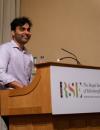Dr Bhuvaneish T Selvaraj (Chancellor's fellow)

- Centre for Clinical Brain Sciences
- UK Dementia Research Institute, Anne Rowling Regenrative Neurology Clinic
- Euan MacDonald Centre for MND Research
Contact details
- Email: bthangar@ed.ac.uk
- @bhuvaneish
Address
- Street
-
Chancellor's building
49 Little France Crescent
The University of Edinburgh - City
- Edinburgh
- Post code
- Eh16 4SB
Background
Bhuvaneish T Selvaraj is an engineering graduate from Anna University, India. He began his scientific research career with a Ph.D in neurobiology at University of Wuerzburg, Germany. In 2014, he moved to University of Edinburgh to undertake his post-doctoral research on human stem cell disease modelling of neurodegenerative diseases. In 2020 he was awarded Chancellor’s fellowship at University of Edinburgh.
Qualifications
2002 - 2006 B.Tech Industrial Biotechnology, Anna University
2007 - 2012 PhD Institute of Clinical Neurobiology, University of Wuerzburg
Current PhD students supervised
Ms. Andrea Salzinger
Ms. Áine Heffernen
Mr. James Cooper
Research summary
Progressive degeneration and loss of neurons is an hallmark feature of many debilitating and incurable neurodegenerative diseases such as Dementia and Motor Neuron Disease (MND). Globally, surge in ageing population leads to rapid rise in prevalence of these diseases culminating as a major health challenge. Thus, there is an huge unmet need to understand disease mechanism and to develop novel neuroprotective strategies to combat these devastating diseases.
We are particularly interested in MND as our disease model, nevertheless, it is becoming increasingly evident that MND and fronto-temporal dementia (FTD) share common underlying mechanism. Motor neurons are amongst the longest neurons in the body with its axon extending up to a metre to connect target muscle. Accumulating evidence suggests MND is multifactorial and independent pathomechanisms affect distinct cellular compartments of motor neurons – soma and axon – leading to motor neuron loss and axon degeneration, respectively. The overarching aim of our research is to decipher the molecular pathomechanisms leading to selective vulnerability of motor neurons as observed in motor neuron disease. In addition, we also focus on understanding and exploit mechanisms that control axonal homeostasis to promote axonal maintenance and preserve axons from degeneration. To achieve this we use cutting edge technologies like human stem cells modelling including 3D organoid models, CRISPR/Cas9 genome editing, electrophysiology and human post-mortem studies.
Collaborators
Prof Siddharthan Chandran
Prof Colin Smith
Prof Dario Alessi (MRC PPU, Dundee)
Prof Adrian Isaacs (UCL, London)
Dr Matthew Livesey (University of Sheffield)
Affiliated research centres
-
Astrocytes mediate cell non-autonomous correction of aberrant firing in human FXS neurons
In:
Cell Reports, vol. 42
DOI: https://doi.org/10.1016/j.celrep.2023.112344
Research output: Contribution to Journal › Article (Published) -
Cell-autonomous immune dysfunction driven by disrupted autophagy in C9orf72-ALS iPSC-derived microglia contributes to neurodegeneration
In:
Science Advances
DOI: https://doi.org/10.1126/sciadv.abq0651
Research output: Contribution to Journal › Article (Published) -
A 3D cell culture system for bioengineering human neuromuscular junctions to model ALS
In:
Frontiers in Cell and Developmental Biology, vol. 11
DOI: https://doi.org/10.3389/fcell.2023.996952
Research output: Contribution to Journal › Article (Published) -
Blood-CNS barrier dysfunction in amyotrophic lateral sclerosis: proposed mechanisms and clinical implications
In:
Journal of Cerebral Blood Flow and Metabolism
DOI: https://doi.org/10.1177/0271678X231153281
Research output: Contribution to Journal › Review article (E-pub ahead of print) -
PolyGA targets the ER stress-adaptive response by impairing GRP75 function at the MAM in C9ORF72-ALS/FTD
In:
Acta Neuropathologica
DOI: https://doi.org/10.1007/s00401-022-02494-5
Research output: Contribution to Journal › Article (E-pub ahead of print)
Invited speaker
1. International symposium on MND/ALS - Glasgow, 2018
2. XXVI World Congress of Psychiatric Genetics (WCPG), Glasgow, 2018
3. Dementia research Institute - Connectome - Reading, 2018
